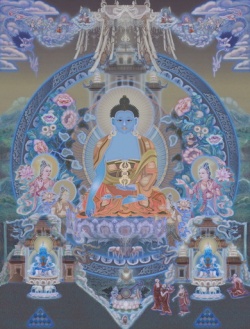The new Buddhist atheism by Mark Vernon
In God is Not Great, Christopher Hitchens writes of Buddhism as the sleep of reason, and of Buddhists as discarding their minds as well as their sandals. His passionate diatribe appeared in 2007. So what's he doing now, just three years later, endorsing a book on Buddhism written by a Buddhist?
The new publication is Confession of a Buddhist Atheist. Its author, Stephen Batchelor, is at the vanguard of attempts to forge an authentically western Buddhism. He is probably best known for Buddhism Without Beliefs, in which he describes himself as an agnostic. Now he has decided on atheism, the significance of which is not just that he doesn't believe in transcendent deities, but is also found in his stripping down of Buddhism to the basics.
Reincarnation and karma are rejected as Indian accretions: his study of the historical Siddhartha Gautama – one element in the new book – suggests the Buddha himself was probably indifferent to these doctrines. What Batchelor believes the Buddha did preach were four essentials. First, the conditioned nature of existence, which is to say everything continually comes and goes. Second, the practice of mindfulness, as the way to be awake to what is and what is not. Third, the tasks of knowing suffering, letting go of craving, experiencing cessation and the "noble path". Fourth, the self-reliance of the individual, so that nothing is taken on authority, and everything is found through experience.
It's a moving and thoughtful book that does not fear to challenge. It will cause consternation, not least for its quietly harsh critique of Tibetan Buddhism as authoritarian. It is full of phrases that stick in the mind, such as "religion is life living itself."
Hitchens calls it "honest" and "serious", a model of self-criticism, and an example of the kind of ethical and scientific humanism "in which lies our only real hope". The endorsement makes sense because Batchelor's is an account of Buddhism for "this world alone". His deployment of reason and evidence, coupled to the imperative to remake Buddhism and hold no allegiance to inherited doctrines, would appeal to Hitchens. And not just Hitchens.
For it's also striking that the first date on the tour Batchelor is currently undertaking to launch the book was hosted not by a temple or meditation centre, but by the humanist chaplaincy of Harvard University. Batchelor's preferred term is "secular" Buddhism, but his work clearly appeals to some atheistic humanists – not least Greg Epstein, the humanist chaplain at Harvard.
Epstein sees Batchelor's contributions as part of a trend in contemporary humanism, one he calls the "new humanism". It's a humanism that focuses not so much on assertions and campaigns, as on an attempt to forge a humanly nourishing way of life. When I ask him, Epstein is nervous of the word "spiritual", though he's keen that organised humanism does more than just "sitting around and philosophising." He himself came to humanism after studying Buddhism. He practices meditation. He tells me that Batchelor's bold attempts to remake Buddhism are appreciated in American humanist circles. There is a hunger for it, he explains, from those who recognise the need for community and ritual. A practice of meditation can provide both: community via the concept of sangha – coming together with a common intent or purpose; ritual by the regular need to practice.
Philosophically, it's easy to see how Batchelor's account of Buddhism might appeal to humanists as well. He draws parallels between the Buddha's teaching and existentialism and pragmatism, two 20th-century philosophies that contemporary humanism has drawn on too.
His quest for the historical Buddha is as interesting. I was reminded of the 19th-century quest for the historical Jesus, which both shattered illusions and inspired new kinds of commitment. Perhaps as theologians now read the Bible as an account of what the first Christians made of the "Jesus event", and treat the text as a resource for responding to it afresh, so western Buddhism will come to be seen not as an exercise in inculturation but as a radically new response to the "Buddha event".
There are questions to ask, such as how compatible Buddhism really is with existentialism and pragmatism. Philosophers like Sartre and Heidegger, for example, are not typically celebrated for their compassion, a key ingredient in any Buddhism. For myself, as an agnostic, I was saddened that Batchelor has now definitively opted for atheism: the closure on the transcendent that decision represents felt like a partial turning away from his previous open efforts to discern the nature of things.
But his books have always challenged, in a committed and affecting way. Therein lies their appeal, and long may it continue. Confession of a Buddhist Atheist is engrossing – another window into one man's "life living itself".

